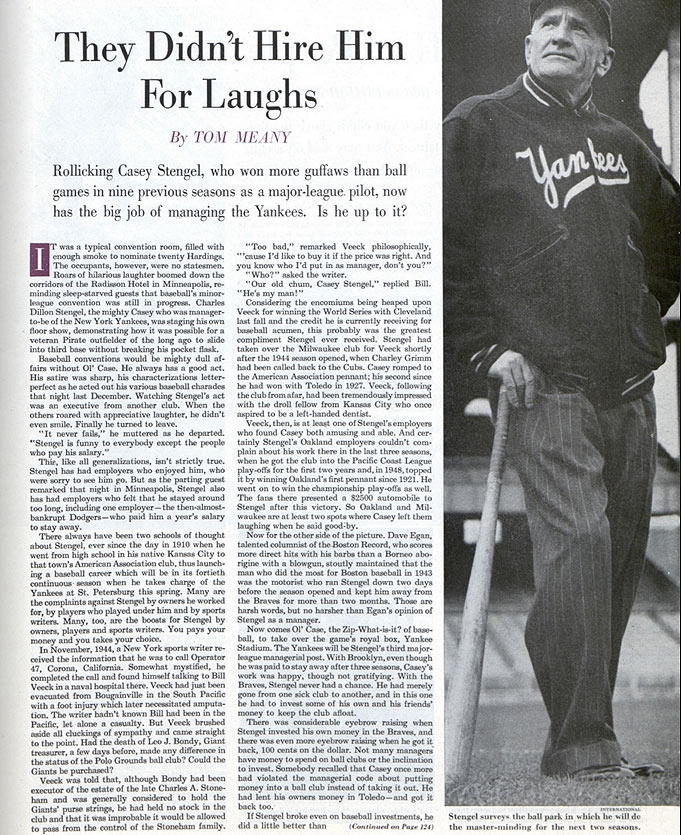Casey Stengel: They Didn’t Hire Him for Laughs
When Casey Stengel became manager of the New York Yankees in October of 1948, most people weren’t too excited about the new hire.
The previous manager, Bucky Harris, had been wildly popular, having taken the Yankees to the World Series championship in 1947. They finished third in 1948, but it was rumored that the reason Harris was fired was that he wouldn’t give general manager George Weiss his home phone number.
When Stengel joined the Yankees, his career as a manager for the Brooklyn Dodgers (1934–1936) and Boston Braves (1938–1943) was considered lackluster. Boston newspaper columnist Dave Egan remarked that Boston’s 1943 team should have considered themselves lucky when a taxi driver ran Stengel over two days before the season opener, fracturing his leg and keeping him away from his duties for almost two months.
When a profile of Stengel appeared in the March 12, 1949, issue of The Saturday Evening Post, writer Tom Meany noted that the Yankees weren’t so sure about Stengel, either: “There has been considerable speculation over the reaction of the old-line Yankees to the appointment of Stengel. … It will be novel, to say the least, for them to be directed by a manager who thus far has gained more fame by his humor than by winning pennants.”
Indeed, Stengel’s most notable traits at the time were his quips and quirky conversational style. Meany wrote, “Although always an entertaining conversationalist, Stengel has a habit of wandering from his point, like a dog turned loose in a rabbit patch.” Stengel once observed that “the secret of successful managing is to keep the five guys who hate you away from the four guys who haven’t made up their minds.”
What Meany couldn’t have guessed as Stengel started his stint with the Yankees is that Stengel would lead the team to five consecutive World Series wins (1949–1953), the most consecutive wins ever by a major league baseball team. What Meany did predict was Stengel’s drive to succeed, writing, “Nine years of trying to win with has-beens and never-weres left its mark on Stengel. He became a desperation manager, like a fellow playing the races with the rent money.” That desperation may have led Stengel to develop some of his unique strategies, including platooning, leveraging pitchers, and getting creative with lineups.
Meany concluded that “despite Stengel’s critics, who think he does it with wisecracks, baseball jobs such as managing the Yankees are handed out on the basis of what you know rather than whom you know. Baseball observers think Casey knows a lot.”
Turns out, he did.

Featured image: Edited image from Baseball Digest, front cover, October 1953 issue (Wikimedia Commons / public domain)